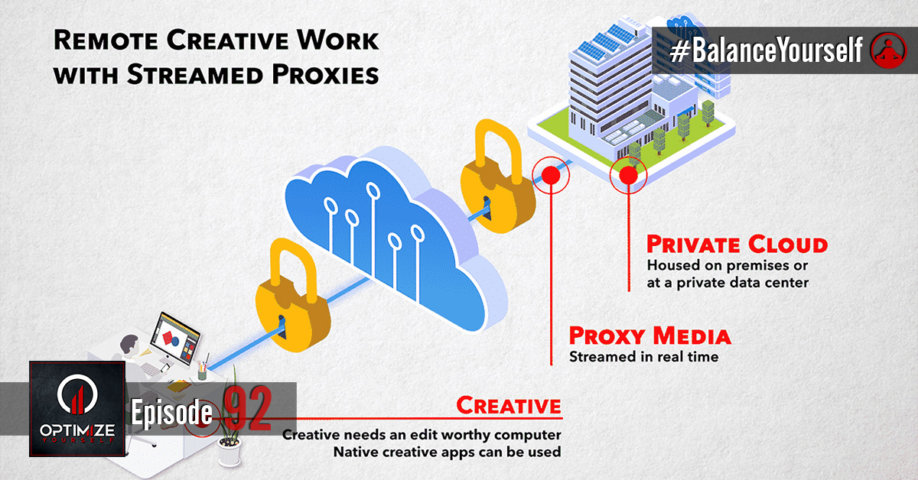As we all begin to settle into what is becoming our “new normal,” one of the most common challenges we face is the inevitability of having to work from home…and ONLY from home…for the foreseeable future. For some like me who have practiced social distancing as an Olympic sport for the last fifteen years, it’s just another week. But for those who’s lives have been turned upside down amidst current events, this transition can be rough.
If you work in the post-production industry specifically, your livelihood literally depends on whether your not you are able to manage large amounts of data, share it with a team, and most importantly collaborate with those who hired you to help them realize their vision. And if you can’t pivot quickly (or if your employer can’t), that might mean you’re out of work for a long time.
In this episode I have an in-depth and candid conversation with workflow expert and tech guru Michael Kammes about all things remote workflow. We talk about the simplest ‘Band-Aid’ solutions just to stop the bleeding, some of the middle-of-the-road options to set up a more viable work-from-home workstation, and we also dive deep into the nuances of the bigger (i.e. more expensive) options available to larger teams, businesses, and studios.
Most importantly, we also address the lesser focused on topic of protecting your mental health and sanity during this transition. It’s not just about managing media and assets, this is also about managing your well-being.
Want to Hear More Episodes Like This One?
» Click here to subscribe and never miss another episode
Here’s What You’ll Learn:
- TIP: Whatever application you’re using – make sure it’s the same version on both sides for compatibility.
- If working with different pools of media, that both sides have copies of the media. Transferring or syncing media can take a ton of time.
- Adopt a real-time collaboration tool and turn the video ON. Not only is this some of the only social engagement you’ll have in a work-day, but you need to be able to see each other’s response.
- Peer-to-Peer solutions (similar to torrents) like Resilio sync are a lot quicker to keep files in sync rather than syncing up to something like Dropbox and back down. Instead it syncs directly.
- File management is more important than ever. (If you were hit by a bus, can someone come behind you and figure out what you were working on?)
- Zack and Michael’s best tips on locking your active bins in a remote collaborative environment. Such as “Avid on Demand”.
- The challenges and benefits of using remote desktop software like Team Viewer to work on your office computer as if you were sitting in front of it.
- Why the old standards and security concerns of cloud storage and remote file sharing are overdue for an update.
- What does “Post-Production in the Cloud” really mean?
- Coming soon: Camera to Cloud instead of local storage.
- How much it costs to work in the cloud.
- What are the best remote collaboration options to review? Frame.io, Evercast, BeBop etc…
- Michael’s adjustment to working from home and some key takeaways from his experience.
- The importance of maintaining a schedule to separate work time/space from personal.
- How to deal with the social isolation and the depression that may come with it.
Useful Resources Mentioned:
Frame.io: Best Practices For Adopting a Remote Post-Production Workflow
Our Generous Sponsors:
This episode is made possible for you by Ergodriven, the makers of the Topo Mat, my #1 recommendation for anyone who stands at their workstation. The Topo is super comfortable, an awesome conversation starter, and it’s also scientifically proven to help you move more throughout the day which helps reduce discomfort and also increase your focus and productivity. Click here to learn more and get your Topo Mat.
Guest Bio:

Facebook | Twitter
Michael Kammes has designed and built thousands of production and post-production systems, workflows, and facility integrations during his nearly 20 years as a technology advisor in the media and entertainment industry. He is a frequent keynote speaker on trends, products, and workflows in production and post technology and his “5 THINGS” podcast draws an audience of industry insiders from around the world.
Michael currently serves as the Director of Business Development at cloud solutions provider BeBop Technology in Los Angeles.
In addition to the technical side of media creation, Michael’s creative work includes the roles of Dialogue Editor, SFX Editor, ADR Recordist & Editor, Re-Recording Mixer, and Supervising Sound Editor.
Show Credits:
This episode was edited by Curtis Fritsch, and the show notes were prepared and published by Glen McNiel.
The original music in the opening and closing of the show is courtesy of Joe Trapanese (who is quite possibly one of the most talented composers on the face of the planet).
Note: I believe in 100% transparency, so please note that I receive a small commission if you purchase products from some of the links on this page (at no additional cost to you). Your support is what helps keep this program alive. If you have any questions, please don’t hesitate to contact me.


